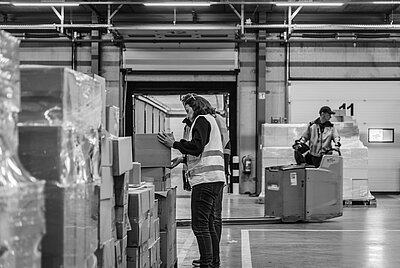Shifting consumer expectations and demands are also shaping what we, as retailers, need to do to ensure that the retail experience is sustainable and meaningful to the people that rely on us. In short, retail has become a front-runner in shaping the future of tomorrow. And we can’t shape the future, without looking back at what we’ve done.
We’ve rounded up some of the biggest trends we saw in retail last year that will help us shape 2023 and beyond.
Supply chain strategy
Retailers across the world have all had to make changes to their supply chain since the pandemic. And while this was a key driver at the time, those changes are becoming more permanent as retailers look to their environmental impact and sustainable sourcing agendas in 2023 and beyond.
As we recently showed in our 2022 Sustainability Report we’ve begun to increase (by 6%) the amount of goods and supplies that we source in Europe. This has a twofold impact on us because we are ensuring the stability of our supply chain while also reducing the number of miles our supplies travel before, they reach our door. This is beginning to make a positive impact on the world around us.
And we’re not alone in having to review the strategy of our supply chain. McKinsey reports that: “Demand volatility, production bottlenecks, rising raw-material and transport costs, and logistics chaos are causing turmoil in global supply chains. At the same time, consumers continue to expect fast and convenient delivery. Players will want to review their supply chains strategically so that they are better prepared for an uncertain future.”
Capgemini also notes visibility and demand sensing as two crucial areas within the supply chain if retailers are to become agile and resilient to on-going turbulence – with just 28% of retailers believing that their supply chain is agile enough.
Sustainability
It’s impossible to ignore that sustainability became one of the most important aspects of success for retailers in 2022.
And key to that success was transparency. It wasn’t enough to simply claim that you were doing things that were good for the environment - you had to build a solid evidence base that proved it. Initiatives like the Sustainable Brand Index make it easier for consumers to see how you really perform against your claims.
In Deloitte’s Retail Trends 2022, it says that circularity and traceability are in demand from consumers – which means taking a detailed look at your supply chain and tracking sustainability from the cradle to the grave.
Of course, we know that this is no easy task. And we’re still evolving on our journey towards sustainability. But we’re trying to remain open and committed to tackling some of the biggest sustainability issues within our business.
By remaining up front with consumers, retailers will help to manage attitudes and expectations towards purchasing with a conscience. The EY Future Consumer Index suggests 43% of global consumers want to buy more from organisations that benefit society, even if it means paying more for their products or services.
Experience shopping
For any retailer pre-pandemic, a good shopping experience was probably on their wish-list. But the pandemic moved shopping beyond a transaction in one domain and into a world of immersive experiences, with an omnichannel buying journey, to revive and revamp post-pandemic retail experiences.
Everything from unboxing to showcase stores were given a boost in 2022 as retailers jumped on the need to differentiate themselves from competitors.
Earlier last year, we wrote about unboxing experiences and the re-imagining of the in-store experience as two key retail trends. And despite the economic uncertainty, big brands like Nike, Lush and Zara have invested millions of Euros into flagship stores packed full of technology in a bid to re-define what shopping means.
Investing in a hybrid shopping journey, that focuses on experiences, will continue to grow as consumers demand more from retailers.
IBM’s Consumers want it all report, says that: “Retailers and brands need to lead with purpose—and use technology as a differentiator—to enable customers to build their own shopping journeys.”
‘Experience shopping’ blends customer insight and technology with tactile and human-centred approaches – something that requires connected thinking right across the retail sector. Let’s see what exciting initiatives brands bring to 2023!
We can help you reach the right people through your brand experience. Speak to our team on +31 (0) 88 494 20 80 or email us at online@worldpack.eu


